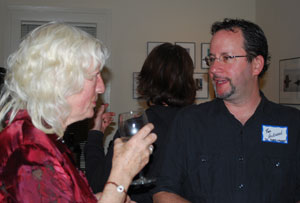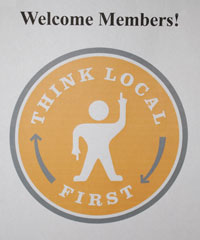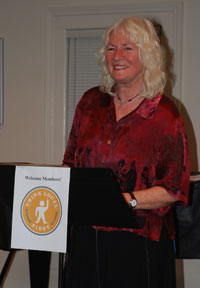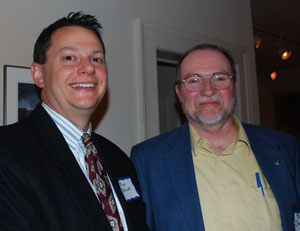Thinking (Eating, Drinking) Local First
A local living economy is about maximizing relationships, not maximizing profits. About a living return, not the highest return. Sharing, not hoarding. Being more, not having more.
Judy Wicks, a leader in the local living economy movement, laid out these and other tenets at Wednesday’s annual meeting of Think Local First, a nonprofit network of local businesses. Though Wicks is from Philadelphia – her 25-year-old White Dog Cafe is how she walks the talk in Philly – the evening’s event was all about how communities can foster and sustain themselves at the local level, regardless of where “local” is on the map.
In this case, local meant the Kerrytown Concert House, where about 50 people gathered to hear Wicks describe her efforts both at White Dog Cafe and as founder of the Business Alliance for Local Living Economies, known as BALLE. She began with a shout-out to Zingerman’s, which was sponsoring her visit (as well as a talk Thursday night at Zingerman’s Roadhouse). Zingerman’s is the best example in the country of a business growing locally, she said. Instead of opening cookie-cutter delis nationwide, they’ve chosen to stay in the Ann Arbor area and diversify their business, looking for what the community needs – a bakery, creamery and more – and then filling that need.
The recent crisis in America’s economy, she said, reinforces the need to invest locally. Rather than investing in anonymous companies, we need to invest in people and businesses close to home. The world food crisis, global warming and reliance on oil are other examples of how the status quo is causing us harm.
Further, the local living economy can be a focal point for bringing together both sides of the political spectrum, Wicks said. The Right values self-reliance. The Left values community. The common ground is in building a self-reliant community.
Wicks spoke of her own journey in founding White Dog Cafe, which started on the first floor of her house and in her back yard, where she put out lawn chairs and an old picnic table. If customers needed to use the restroom, they went up to the one the family used on the second floor. She kept the day’s earnings under her pillow. It was a homey place, literally.
Today, the cafe is housed in three adjacent brownstones, with an additional gift shop called the Black Cat. It’s a $5 million business employing 100 workers, with the shared mission of serving customers, employees, the community and nature.
Early on in her venture she discovered how the short distance between her home and her business made it easy to see the impact of her decisions, whether it was getting customer feedback on the color of her curtains or deciding to pay her workers a living wage because she encountered them every day and knew about their lives.
Wicks also urged the audience to consider redefining measures of success. The traditional measure is continual financial growth. But what if growth were measured in other ways: By having more fun, or deepening relationships, or growing your consciousness? So the cafe started a speaker series, for example, inviting recent immigrants in to talk about their experiences, or a lesbian couple to talk about adopting a child – different ways to show the community’s interconnectedness.
That interconnectedness also caused her to realize there was no such thing as a single sustainable business. Rather, there needs to be a sustainable system. Nature is cooperative, she noted, and businesses can be, too. One example: When several locally owned coffeeshops realized their main competitor was Starbucks, they pooled resources to buy mugs that displayed all of their different logos – a marketing tool that none of them could have afforded on their own.
The Sustainable Business Network of Greater Philadelphia, which Wicks also helped launch, is another example of cooperation. It was formed by looking for the building blocks of a sustainable community: Food, energy, independent media, clothing, capital, green building and more. People were already involved in these various areas – the network helped connect the dots, Wicks said. They’d start each meeting by asking who had purchased something from someone else in the room. They’d make pledges at their annual meeting on things they’d do in the coming year to support each other and the community, things as small as starting a composting program. They’d be asked to report on their progress the following year. They educated each other about the different parts of the network, Wicks said, and educated public officials as well, especially newly elected ones.
Wicks’ vision for the national alliance, BALLE, began when she saw that progressive companies like Ben & Jerry’s were being bought by large corporations. This was concentrating wealth and power even further, and as a nation we were forgetting the important issue of ownership in a democracy. “The more owners we have,” she said, “the more freedom we have.”
Wicks founded the alliance in 2001, hoping to build an intricate web of local networks, globally connected through fair trade relationships. Today, there are 60 BALLE affiliated networks, including Think Local First here in Washtenaw County.
Think Local First Annual Meeting
Before Wicks spoke, the group held its annual meeting at the same location. Richard Bellas, president of the board and owner of Van Boven Shoes, urged members to give of their time, talent and treasure in the coming year to help build the network. Ingrid Ault, the group’s part-time executive director, gave a report on several initiatives, including the upcoming Buy Local Week from Nov. 15-22. Because of the current economic conditions, she said, more people are open to the message of supporting local businesses.

Judy Wicks talks with Paul Hickman, a Think Local First board member and owner of paul m. hickman, during Wednesday evening's event.
Think Local First suffered a setback when the Ann Arbor Downtown Development Authority didn’t renew a $12,000 grant this year that accounted for 25 percent of revenue. That’s prompted the board to try to come up with more ways to raise money, and a fundraiser is being planned to bring the film “Asparagus! A Stalkumentary” to the Michigan Theater sometime early next year.
Ault also said she was encouraged that two of the new city council members – Sandi Smith and Carsten Hohnke – are connected to businesses that are members of Think Local First. Smith is a partner in Trillium Real Estate, and Hohnke’s wife, Heather Dupuis, owns Vie Fitness & Spa. It’s important for council to recognize that local businesses are the backbone of this community, she said.
Randy Holtzman, the group’s treasurer and owner of Insight Financial, gave a financial report, noting that they needed to do additional fundraising to get them through the current fiscal year, which ends June 30 2009. He noted that there are 156 members in the network, but that everyone needs to help recruit more. Holtzman also asked members to volunteer for fundraising events and consider joining the board.
Karl Pohrt, another board member and owner of Shaman Drum Bookshop, spoke about an idea he had for the network. At the board’s retreat earlier this year, they’d discussed the need to educate each other about the local living economy. Pohrt proposed starting a discussion group for that purpose, kicking off with the Andersonville Study of Retail Economics, which shows how a greater percentage of dollars spent locally are actually reinvested back into the community. He noted that he had watched the devastation of his hometown of Flint when GM shut down plants there decades ago, and that when he moved to Ann Arbor and started to raise a family, he vowed to defend his community from outside forces. “At age 61,” he said, “my politics are basically rooted in that.”
The annual meeting ended with an award presented to former Think Local First director (and current board member) Lisa Dugdale, for her work getting the group off the ground. Keeping with the Buy Local theme, the plaque was a framed ceramic tile from Motawi Tileworks.
Editor’s note: Another approach to supporting local economies is through local vendor preferences in bidding for government contracts, something discussed at the last county board of commissioners meeting.








